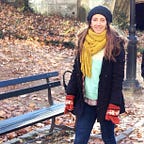A Day in the Life (of a Translator)
Translation of Poetry: Gabriela Mistral.
Lucila Godoy Alcayaga, who was best-known by her literary pseudonym, Gabriela Mistral, was a Chilean educator, diplomat and writer. She was born in 1889 in Vicuña, Chile, a village nested in the Andes, north of Santiago.
Her first poems were published in 1904 in El Coquimbo and La Voz del Elqui, two local newspapers. It was around those years that she published Sonetos de la muerte, a collection of love poems in memory of the dead, which made her known throughout Latin America. In 1922 she wrote her first great collection of poems, Desolación, and later in 1924 appeared Ternura , a volume of poetry dominated by the theme of childhood.
She lived in Italy and France, were she worked for the League for Intellectual Cooperation of the League of Nations, attending conferences of women and educators throughout Europe. She was involved in the shaping of Mexico’s and Chile’s education systems. She also worked as a consul from 1932 until her death, in cities like Naples, Madrid, Lisbon, New York, and others.
Finally in 1945 she was awarded the Nobel Prize of Literature, making her the first Latin American author to receive this award.
These verses that I have translated belong to her poem Blanca Nieve en la casa de los enanos, and it belongs to a collection of children’s poems that recreate Grimm’s classical fairy-tales. This particular poem was first published in 1925 in El Espectador newspaper in Bogotá. Now, nearly a century later, the publishing house Amanuta published them in a new format, with beautiful illustrations. Although addressed to children, these poem, filled with the musicality given by the octosyllabic verses and the delicate language, make it very pleasant to read.
Having lived in Chile for some time, Chilean literature holds a special place in my heart. I hope you enjoy these verses as much as I enjoyed translating them.
De la barranca, la niña
miró a la loma cercana;
ya se apretaba la noche
como una negra cuajada.
En lo alto de una loma
está encendida una casa,
y pestañea en la sombra
como una madre que llama.
Standing on a slope, the girl
looked at the hill rising close,
just as night began to fall
and cast a veil of darkness upon it all.
At the top of the hill there is
a house glowing bright,
blinking from the shadows it was
like a mother calling her child.
Bibliography: Nobel Lectures, Literature 1901–1967, Editor Horst Frenz, Elsevier Publishing Company, Amsterdam, 1969.
